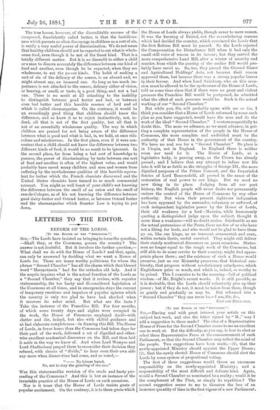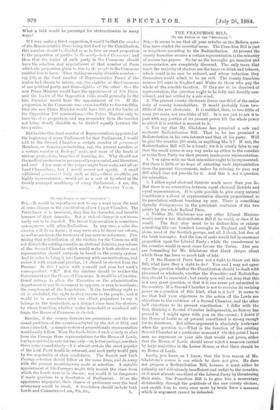[To THE EDITOR OF THE "SPECTATOR."' SIR,—Having read with great
interest your article on this subject last week, and also the letter signed by "M.," may I add a suggestion to those made ? The idea of a Representative House of Peers for the Second Chamber seems to me an excellent one to work at. But the difficulty, as you say, is how to elect or select these Representative Peers at the commencement of each Parliament, so that the Second Chamber may reflect the mind of the people. Two suggestions have been made,— (1), that the
• newly-appointed Ministry should appoint the Upper House ; (2), that the-newly elected House of Commons should elect the Lords by some system of proportional voting.
The first of these suggestions would throw an enormous responsibility on the newly-appointed Ministry ; and a responsibility of the most difficult and delicate kind. Again, would a Second Chamber so nominated be a reality ; would it be the complement of the First, or simply its repetition ? The second suggestion seems to me to threaten the loss of an immense qus.ntity of time in the first vigour of a new Parliament. What a field would be presented for obstructionists in many ways !
If I may make a third suggestion, it would be that the number of the Representative Peers being first fixed by the Constitution, this number should be divided so as to bear an exact proportion to the proportion of parties in the newly-elected Commons ; and then that the leader of each party in the Commons should have the selection and appointment of that number of Peers which the proportion given to him by the people in the Commons entitled him to have. Thus (taking an easily divisible nu mber,— say 20, as the fixed number of Representative Peers) if the nation had chosen to return, say, five-eighths of the Commons of one political party, and three-eighths of the other—then the new Prime Minister would have the appointment of 150 Peers, and the leader of the Opposition ( who would generally be the late Premier) would have the appointment of 90. If the proportion in the Commons was seven-twelfths to five-twelfths, then the new Prime Minister would have 140, and the leader of the Opposition 100 nominations,—the Prime Minister only to have his clear proportion, and any remainder from the number not being clearly divisible to be divided equally between the two parties.
But besides this fixed number of Representatives appointed at the beginning of every Parliament for that Parliament, I would add to the Second Chamber a certain number of permanent Members, or Senators,—including, say, the present number, or a certain number of Bishops' seats, and more of the heads of various professions, branches of learning, &c. Why should not the medical profession be permanently represented, and literature, and art? A few more of the judges might have seats, and all ex- Lord Chancellors ; but I would sooner not specify. A small additional permanent body such as this,—these ex-officio, yet highly representative,—would act as a sort of fly-wheel in the freshly arranged machinery of every Parliament.—I am, Sir, A COUNTRY VICAR.



































 Previous page
Previous page